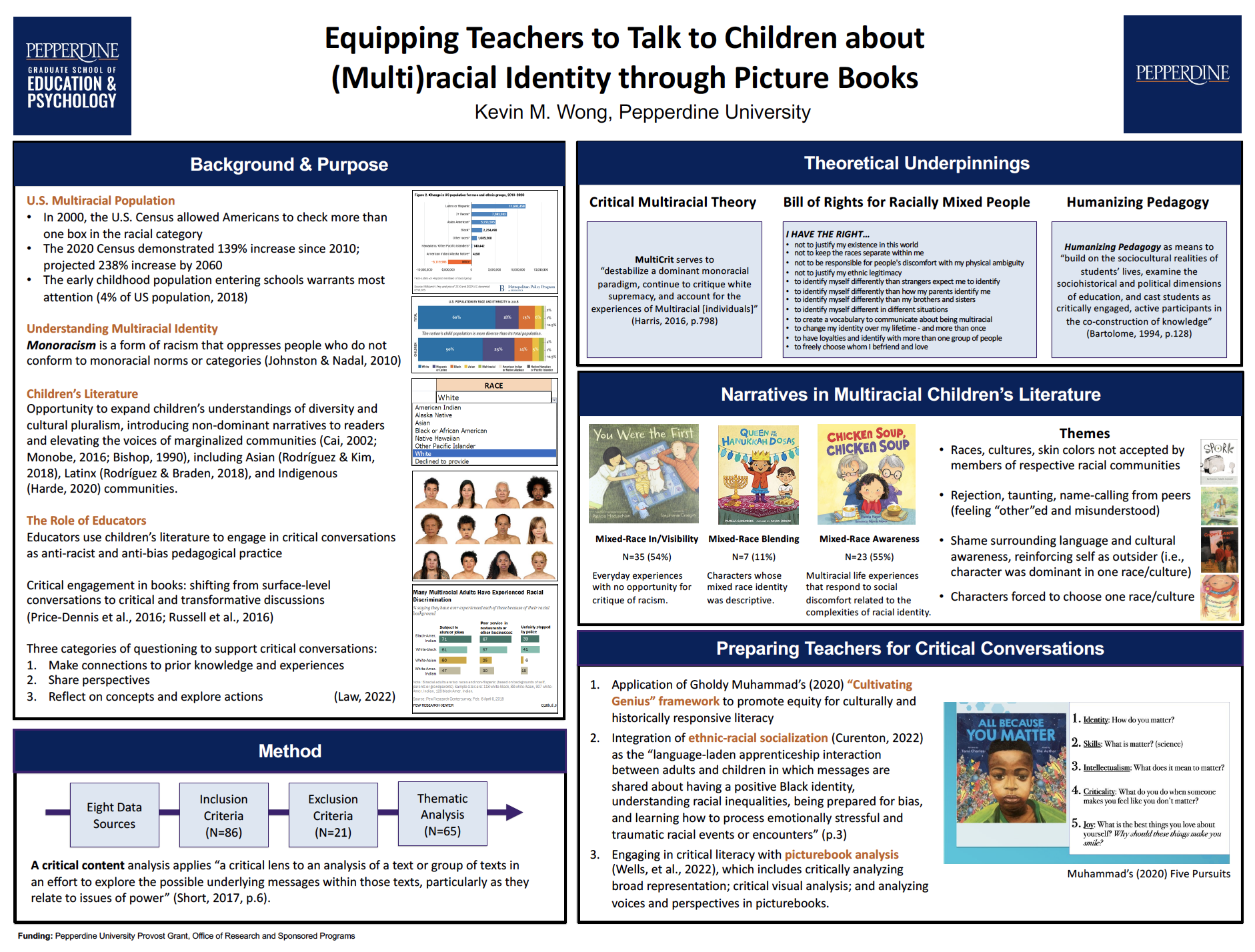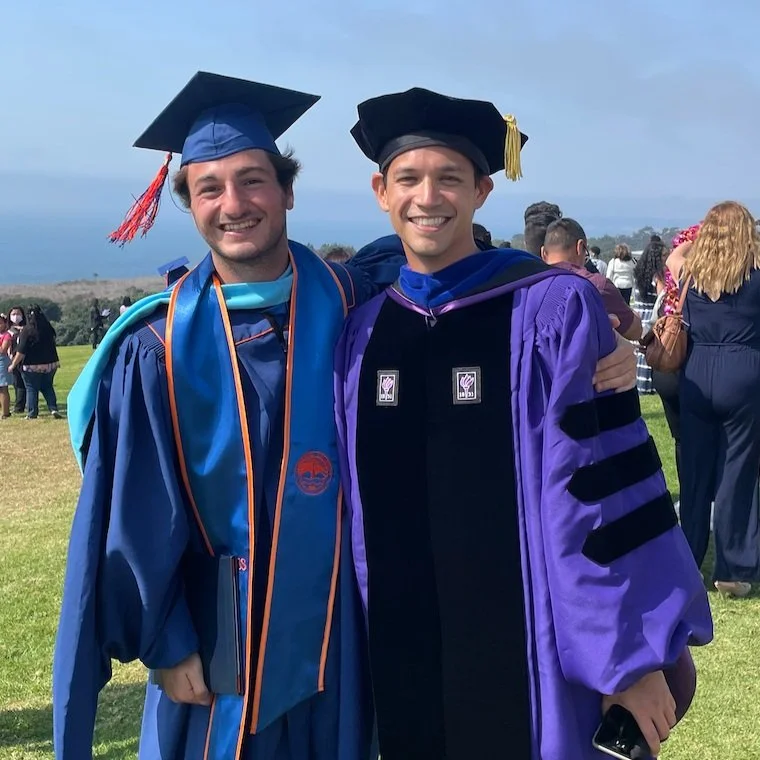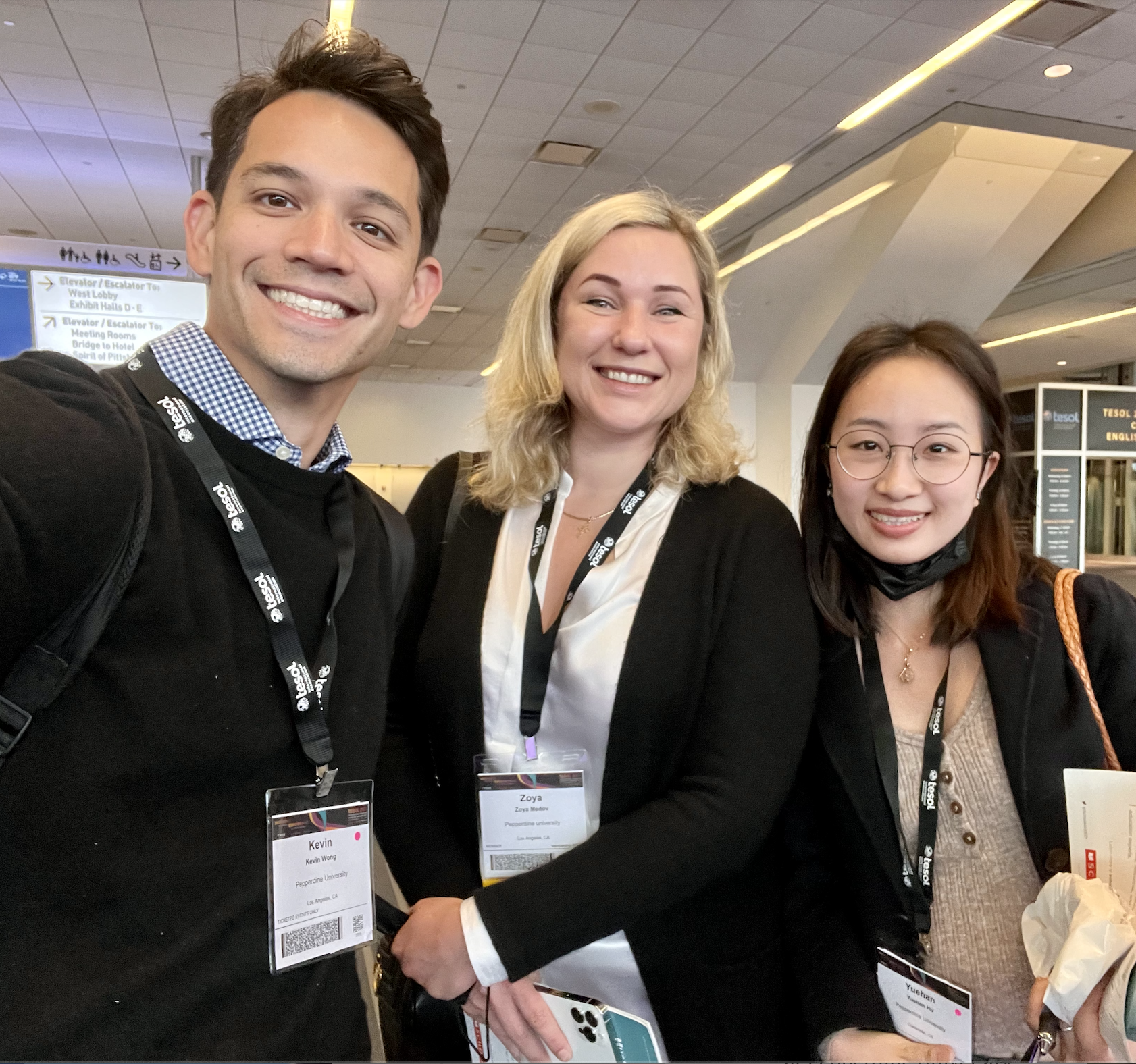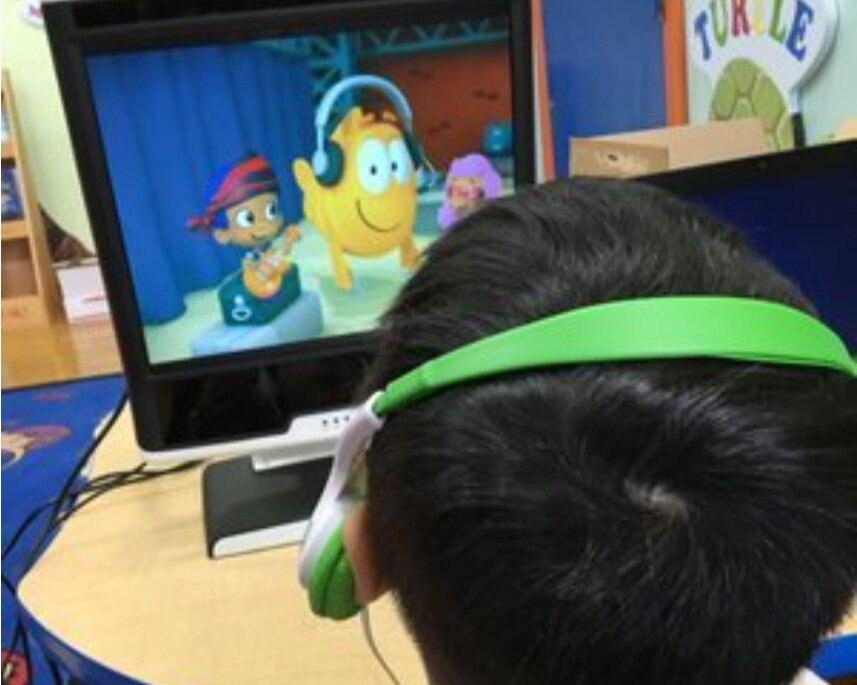Multilingual, Multiracial, and Multicultural Education (MMM) Research Group
Kevin M. Wong, Ph.D.
Principal Investigator
Kevin M. Wong is a scholar of language learning and early literacy development at Pepperdine University. He examines bi/multilingual teaching and learning in K-12 contexts, with the goal of promoting new language learning and heritage language maintenance in children. He is particularly interested in better understanding multilingual education for multiracial children.
黃浩文博士是佩珀代因大學從事語言學習和早期讀寫能力發展的學者。他以促進兒童的新語言習得和傳統語言傳承為目標,從事K-12背景下的雙語以及多語教學的研究。他對多種族兒童的多語言教育有著濃厚的興趣。
Feidana Yalikun
Lab Manager / Doctoral Student
Feidana Yalikun is currently pursuing her Ph.D. in Global Leadership and Change at Pepperdine University' Graduate School of Education and Psychology. She has a strong interest in teaching, linguistics, and language preservation, particularly among endangered languages. Feidana received her BA in Chinese Language and Literature from Jimei University and her MA in TESOL from Pepperdine University. She gained professional experience in this field working in some of the most prestigious institutions in China. She strives to help students overcome language barriers with her fundamental knowledge of language education. In Feidana's spare time, she loves painting, skiing, hiking, and learning about anything that interests her.
斐达娜·亚力坤目前正在佩珀代因大学教育和心理学研究生院攻读TESOL的文学硕士学位。她在集美大学获得了中国语言和文学学士学位。她曾在中国著名的语言教学机构教学并积累了丰富的经验,她立志于用自己在语言教育方面的知识和理解帮助学生克服语言壁垒。同时,她也对教学、社会语言学以及濒危语言保护有着浓厚的兴趣。她喜欢在业余时间绘画、滑雪、徒步旅行,以及发掘自身对不同事物的兴趣。
Yi (Lucy) Lu, Ph.D.
Member
Yi (Lucy) Lu earned her Ph.D. in Global Leadership and Change at Pepperdine University Graduate School of Education and Psychology. Yi is originally from Beijing, China, having her BA in Medical English from Beijing University of Chinese Medicine. She received her Master's degree in MAT-TESOL at the University of Southern California. Currently, Yi is working as a full-time instructional designer on the MS programs at GSEP. Her research interests are bilingual education, TESOL, multicultural education, course design, and online learning. She enjoys hiking, cooking, reading, and playing with her basset hound baby in her leisure time.
鲁艺是佩珀代因大学教育和心理学研究生院,全球领导力与变革项目的在读三年级博士生。她来自中国北京,她毕业于北京中医药大学获得了医学英语学士学位,之后她又在南加州大学获得了教育文学硕士学位。目前,她是GSEP理学硕士项目的全职教学设计师。她主要从事双语教育、TESOL、多元文化教育、课程设计和在线学习的研究。在闲暇时间, 她喜欢徒步旅行、烹饪、阅读,以及与她的巴吉特猎犬玩耍。
Xintian (Iris) Ji
Doctoral Student
Xintian (Iris) Ji is a Ph.D. student at Pepperdine University. As a language teacher, she believes in the power of multilingual and multicultural education and seeks educational equity for all students. Her research interest is in language education and bilingual education. Her academic credentials include a BA in English Teaching and MA in TESOL.
纪心田是佩珀代因大学的博士生。作为一名语言教师,她相信多语言和多文化教育的力量,并追求所有学生的教育公平。她的研究方向是语言教育和双语教育。她的学历包括英语教学学士学位和对外英语教育硕士学位。
Ana Guzman
Doctoral Student
Ana Guzmán received her master’s in Teaching English to Students of Other Languages (TESOL) from Pepperdine University. She holds a California Single Subject Art Credential with a Dual Language Authorization. Ana has seventeen years of experience as a Secondary School Art teacher and is currently teaching English to adult learners at Pasadena City College and working towards her Ed.D. in Learning Technologies.
Jiangfeng (Robert) Li
Doctoral Student
Jiangfeng Li is a Ph.D. student majoring in the Global Leadership and Change program at Pepperdine University where he also serves as a research assistant at the Graduate School of Education and Psychology. Jiangfeng Li holds a B.A. in Chinese Language and Literature in China and an M.A. in Teaching English to Students of Other Languages (TESOL) from Pepperdine University. Growing up in a community where there are a variety of ethnic minorities makes him passionate about education. He particularly wishes to initiate academic and social advancements for individuals who are from culturally diverse and underrepresented backgrounds by guiding them toward available educational resources and learning opportunities with the help of technology.
李疆丰是佩珀代因大学全球领导力与变革专业的博士研究生,同时也担任教育与心理学研究生院的研究助理。他在中国就读本科并获得中文语言文学学士学位,随后在佩珀代因大学获得了对外英语语言教学(TESOL)的硕士学位。李疆丰在一个充满着各种少数民族的社区长大,这种多语言,多文化的环境使他对教育充满热情。他希望通过科技找到可用的教育资源和学习机会,推动来自不同文化背景且缺乏代表性的学生在学术和在社会上进步。
Yujing Li
Doctoral Student
Yujing Li is a doctoral student in the Ed.D. Organization Leadership Program at Pepperdine University. Her passion for education is seeing personal growth and holistic development among students. She completed a BA in Early Childhood Education and a MA in TESOL. She believes Early Childhood is one of the most beautiful and critical developmental stages. You can either find her singing or snowboarding in her spare time.
Liwei Fang
Doctoral Student
Liwei Fang is an EdD student majoring in Educational Technology at the Graduate School of Education and Psychology at Pepperdine University, where she also works as a graduate assistant in Intercultural Affairs. She earned a B.A. in Child Development from Michigan State University and an M.A. in TESOL from the University of Southern California. Growing up in a loving family and attending an international high school, Liwei developed a deep appreciation for cultural diversity, which nurtured her passion for cross-cultural communication and education. Drawing from her varied educational experiences, she is dedicated to exploring innovative teaching practices with the help of technology that bridge cultural divides and empower learners globally, with a particular interest in bilingual education as a means of fostering global understanding and collaboration.
方力维是佩珀代因大学教育与心理研究生院教育技术专业的博士生,同时在校际文化事务办公室担任研究生助理。她拥有密歇根州立大学儿童发展专业的学士学位,以及南加州大学TESOL(对外英语教学)专业的硕士学位。成长于一个充满关爱的家庭,并在一所国际高中就读的经历,让她对多元文化有了深刻的理解和热爱,也培养了她对跨文化交流和教育的热情。结合多样的教育背景,她致力于利用科技探索创新的教学实践,以弥合文化差异并赋能全球学习者,特别关注通过双语教育促进全球理解与合作。
Ruolan Huang
Doctoral Student
Ruolan Huang is an EdD student in educational technology at Pepperdine University's Graduate School of Education and Psychology. She received her undergraduate degree in Psychology from Auburn University and a Master's degree in Economics and Public Policy from the University of Queensland. She has been educated in the United States since high school and accumulated three years of international school teaching experience after her master's degree. Based on these experiences, she has a passion for international education, especially in the field of bilingual teaching and educational psychology, and is committed to exploring innovative ways of education and contributing to the development of international education.
黄若岚是佩珀代因大学教育与心理研究生院教育技术专业的博士生。她本科毕业于奥本大学,主修心理学,并在昆士兰大学获得经济与公共政策硕士学位。从高中开始,她便接受美国教育,并在硕士毕业后积累了多年国际学校教学经验。基于这些经历,她对国际教育充满热情,尤其关注双语教学和教育心理学领域,致力于探索教育创新方式,为国际教育的发展贡献力量。
Ashley Parker
Research Assistant
Ashley Parker is a Master’s student in the TESOL program at Pepperdine University, where she also serves as a research assistant to Dr. Wong. Ashley holds a BS in Communication Sciences and Disorders from Abilene Christian University, with minors in Psychology and Bible. Her study abroad semester in Leipzig, Germany left a lasting impression on her life and altered her worldview, ultimately changing her career path to language education. After completing a TEFL certification, Ashley began tutoring English language learners from around the world through online platforms. In her spare time, Ashley is an avid reader, nature enthusiast, and dog lover.
MMM Alumni
Former Doctoral Students
Research Projects
Translanguaging pedagogy in Chinese-English bilingual programs
Translanguaging pedagogy is an approach to language education that acknowledges and values the use of multiple languages in the classroom. In Chinese-English bilingual programs, translanguaging pedagogy allows students to use both Chinese and English in their communication and learning, recognizing that the use of both languages can facilitate deeper understanding and meaningful engagement with course content.
Research has shown that translanguaging pedagogy can have a number of positive effects on bilingual students. For example, it can help to promote bilingualism and multilingualism, as well as strengthen students' linguistic and cultural identities. It can also support academic achievement, as students are able to draw on the resources of both languages in order to express their ideas and understand new concepts.
In addition to these benefits, translanguaging pedagogy can also support the development of critical thinking skills, as it requires students to reflect on the different ways that ideas can be expressed in different languages. This can help students to become more adept at analyzing and synthesizing information, as well as at communicating their ideas effectively in different linguistic and cultural contexts.
Overall, translanguaging pedagogy has the potential to transform the language learning experience for Chinese-English bilingual students, helping them to develop a more comprehensive and nuanced understanding of both languages and the cultures they represent.
Multiracial identity in children’s literature
Multiracial identity is a complex and multifaceted aspect of an individual's identity that can be influenced by a variety of factors, including their racial and ethnic background, cultural upbringing, and personal experiences. In recent years, there has been a growing recognition of the importance of representing multiracial identities in children's literature, as this can help children of multiracial backgrounds feel seen and validated in the stories they read. It can also help to promote understanding and acceptance of multiracial identities among children of all backgrounds. Children's literature has the power to shape young readers' understandings of the world and their place in it, and including diverse representations of multiracial identities can play a vital role in promoting inclusivity and acceptance.
There is a growing body of research on the representation of multiracial identity in children's literature, and this research suggests that there is a need for more inclusive and nuanced depictions of multiracial characters. Many studies have found that multiracial characters are often underrepresented in children's literature, and when they are included, they are often stereotypical or limited in their portrayal. This lack of representation can have negative effects on the self-esteem and identity development of multiracial children, as it may lead them to feel that their experiences are not valued or recognized in the media they consume.
In order to address this issue, it is important that children's literature actively seeks out and includes diverse and nuanced portrayals of multiracial characters. This can be done through the inclusion of more multiracial characters in children's books, as well as through the development of specific texts that focus on the unique experiences and challenges faced by multiracial individuals. By ensuring that children's literature reflects and affirms the experiences of multiracial individuals, we can help to create a more inclusive and equitable society for all.
Humanizing Pedagogies in Language Education
Humanizing pedagogies in language education involve teaching methods that prioritize the humanity of both the instructor and the students. These pedagogies recognize that language learning is a personal and social process, and that language educators have a responsibility to create a supportive and inclusive learning environment.
One key aspect of humanizing pedagogies is the use of learner-centered teaching methods, which allow students to have a greater degree of agency and choice in their own learning. This can involve techniques such as project-based learning, cooperative learning, and the use of authentic materials.
Another important aspect of humanizing pedagogies is the recognition of the diverse backgrounds and experiences of language learners. This can involve incorporating culturally relevant and inclusive materials into the curriculum, and using language teaching methods that are responsive to the needs and experiences of diverse student populations.
Overall, humanizing pedagogies in language education aim to create a more engaging, meaningful, and equitable learning experience for all students, and to recognize the inherent humanity of both the instructor and the learners.
Multilingual learning from educational media
Multilingual learning in early childhood can have numerous benefits for children's cognitive and social development. Studies have shown that young children who are exposed to multiple languages can have improved memory and problem-solving skills, as well as higher cognitive flexibility and executive function. In addition, multilingualism can also have social and cultural benefits, as it can facilitate communication with a wider range of people and expose children to diverse perspectives and ways of life.
Educational media can be an effective tool for supporting multilingual learning in early childhood. Children's programming and educational apps can introduce young children to new languages and provide them with opportunities to hear and practice new words and phrases in a fun and engaging way. It is important, however, to ensure that the media being used is developmentally appropriate and culturally sensitive.
It is also important to consider that children learn languages most effectively when they are immersed in a linguistic environment, such as being spoken to regularly in a second language by a caregiver or being enrolled in a bilingual educational program. Educational media can be used to supplement and support language learning, but it should not be relied upon as the sole means of language acquisition.
Language Teaching in Online/Hybrid Environments
The COVID-19 pandemic has had a significant impact on the way language is taught, with many educational institutions moving to online or hybrid environments in an effort to keep students and teachers safe. While there have been challenges to teaching language online, there have also been some benefits.
One benefit of teaching language in online or hybrid environments is the increased flexibility it offers. Students can access course materials and attend virtual classes from anywhere, making it easier for them to fit language learning into their schedules. Additionally, online language learning can be more convenient for students, as they do not need to commute to a physical location for class.
However, there are also challenges to teaching language in online or hybrid environments. One of the main challenges is the lack of face-to-face interaction, which can make it more difficult for students to ask questions or get feedback from their teachers. Additionally, some students may struggle with the technology or find it harder to stay motivated when learning online.
To address these challenges, teachers can make use of a variety of online tools and resources to enhance the learning experience. These may include video conferencing platforms, virtual whiteboards, and language learning software. It is also important for teachers to be proactive in providing support and encouragement to their students, and to create a sense of community within the online learning environment.
Overall, while there have been challenges to teaching language in online or hybrid environments during the COVID-19 pandemic, there are also many benefits to be gained. By leveraging technology and being proactive in supporting students, teachers can help ensure that language learning remains effective and engaging in these new modalities.
Early literacy and multilingual research in the Philippines
Early literacy is the foundation upon which children build their reading and writing skills, and it is a crucial predictor of later academic success. In the Philippines, early literacy is a particularly important issue because of the country's linguistic diversity. With over 170 languages spoken across the archipelago, many children in the Philippines grow up speaking a language other than Tagalog or English, the two official languages of the country.
Multilingualism is common in the Philippines, and research has shown that children who grow up speaking multiple languages tend to have cognitive and linguistic advantages. However, there are also challenges associated with multilingualism, particularly in the context of early literacy development. For example, children who speak a language other than Tagalog or English at home may face barriers to accessing early literacy instruction in school.
To address these challenges, researchers in the Philippines have focused on developing and evaluating literacy interventions for multilingual children. These interventions often involve using the child's home language as a bridge to learning Tagalog or English, as well as incorporating cultural elements and traditional stories and songs into the curriculum.
Overall, research on early literacy and multilingualism in the Philippines has demonstrated the importance of considering linguistic diversity in educational interventions and the potential benefits of using the home language in early literacy instruction. However, more research is needed to understand the specific needs and challenges faced by multilingual children in the Philippines and to develop effective approaches to supporting their early literacy development.



































